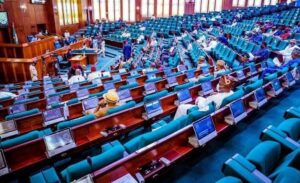The Speaker of the House of Representatives, Tajudeen Abbas, has decided to pull back a controversial bill that had sparked widespread anger and opposition. This bill aimed to make it illegal for people to refuse to sing Nigeria’s old national anthem, “Nigeria, we hail thee,” which was recently brought back into use.

Abbas initially supported this bill, which proposed a harsh punishment of 10 years in prison for anyone who refused to sing the reintroduced anthem. The bill, known as the Counter Subversion and Other Related Bills, was part of an effort to enforce the new anthem after it replaced the more modern “Arise, O Compatriots.”
The controversy began when Abbas, along with Senate President Godswill Akpabio and other lawmakers, passed the National Anthem Bill 2024 in May. This law officially reverted Nigeria’s national anthem back to “Nigeria, we hail thee,” a move that was signed into law by President Bola Tinubu on May 29, 2024, marking the first anniversary of his government.
However, many Nigerians were not pleased with this change. They felt that it was a misguided decision that did nothing to address the serious social, economic, and security issues facing the country. There was strong resistance to abandoning the familiar anthem, “Arise, O Compatriots,” and many vowed to keep using it despite the new law.
In defense of the change, President Tinubu argued that “Nigeria, we hail thee” better represented the nation’s diversity and the unity among its people.
To ensure that everyone complied with the new anthem, Abbas introduced the Counter Subversion and Other Related Bills in July, which successfully passed its second reading in the House of Representatives. However, this move was met with significant criticism from prominent figures like former Minister Oby Ezekwesili and activist Aisha Yesufu, who saw it as a misguided and unnecessary law.
The public outcry against the bill grew louder, leading Abbas to reconsider his position. On Wednesday, his spokesperson, Musa Krishi, released a statement announcing the withdrawal of the bill. Abbas, after careful consideration of the current state of the nation, decided that it was not in the best interest of the country to push forward with such a divisive law.




